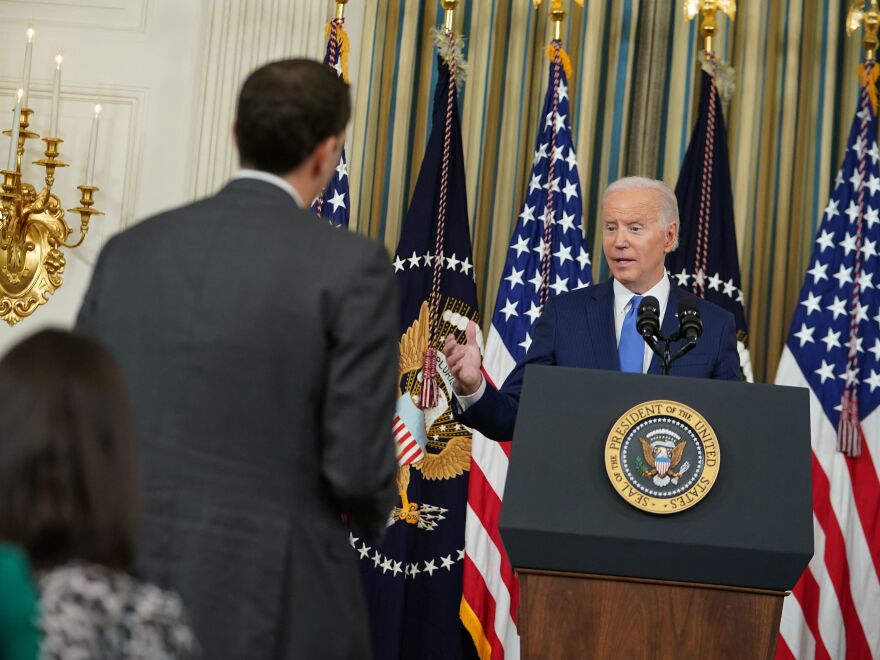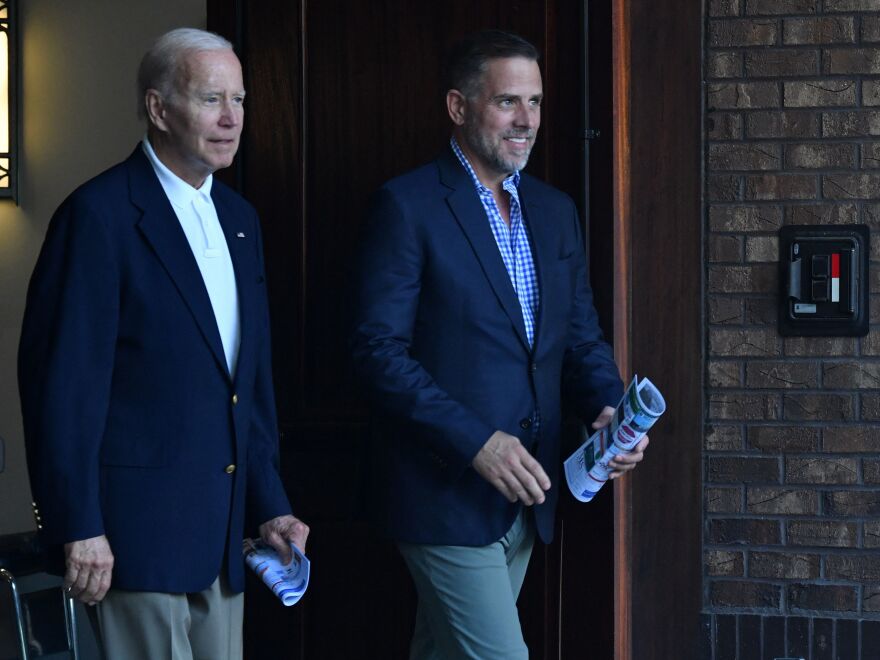President Biden is entering a new — and perhaps more challenging — phase of his presidency: divided government.
Results are not settled, particularly for the Senate. But Republicans appear likely to control the House of Representatives. And that means Biden's ambitious legislative agenda essentially will come to a standstill.
Experts say even the most basic acts of governing — such as passing a budget or raising the debt ceiling to prevent the U.S. from default — could become a legislative grind in the new Congress. And if the GOP takes control of the Senate, judicial confirmations could crawl to a halt.
Regardless of the final tally, Biden has said he's willing to try to find consensus across the aisle.
"I'm prepared to work with my Republican colleagues," he told reporters the day after the election. "The American people have made clear, I think, that they expect Republicans to be prepared to work with me as well."
Biden said he sees the close margins as an opportunity for leverage.
"There's always enough people on the other team — whether it's Democrat or Republican — that the opposite party can make an appeal to and maybe pick them off to get the help," he said.
But there's skepticism about the prospects for White House compromise in a Congress that's become increasingly polarized.
"Of course, they should always talk about things that would tangibly improve people's lives and secure their rights, but it's really hard to see where that's real," said Mari Urbina, managing director with the progressive organization Indivisible.

It's unclear where Biden is willing to compromise
Biden has said he plans to invite leaders from both parties to the White House later this year to discuss how they might work together.
But he didn't make clear what those potential areas of consensus could be. The president has previously spoken about opioids, cancer, mental health and veterans issues as a "unity agenda" where Republicans and Democrats might find common ground.
Biden also recently expressed hopes for a continued bipartisan approach to Russia's war in Ukraine, though in recent months, some Republicans have begun voicing concerns over the large sums of money being given to the Ukrainian government.

He may have the chance to wield the veto pen
Biden was more explicit about areas where he will not compromise. He said he will veto any attempts to create a federal abortion ban, or to repeal the Inflation Reduction Act — the signature climate and health care bill Democrats passed this summer. He has also said he won't accept major cuts or changes to Social Security or Medicare, a proposal put forth by Sen. Rick Scott, R-Fla., chairman of the National Republican Senatorial Campaign Committee.
Some Democrats see a messaging upside to this potential legislative stalemate.
With divided government, "his conversation with the American public gets a lot easier in some ways, politically," said Faiz Shakir, a longtime adviser to Sen. Bernie Sanders, I-Vt. "You can say, 'This is what I want to do. This is the agenda I want to pass. And I got Republicans here in the House standing in my way.' "
In other words, the contrast becomes easier than it's been these last two years when Democrats controlled the House and the Senate, but fought about policy amongst themselves.

Biden will focus on foreign policy, and try to use more executive actions
With legislation stalled, the president is more likely to try to advance his domestic policy using executive actions, much like his predecessors who have dealt with split government.
Biden is also more likely to turn his focus to foreign policy, where presidents have more executive power to begin with.
Late Thursday, Biden left for a series of summits overseas, featuring a face-to-face meeting with China's President Xi Jinping on the sidelines of the G-20 in Bali. Navigating competition with China and managing the war in Ukraine are two key diplomatic priorities for this White House that will continue to be pressing issues after the midterms.
Republicans may face the risk of overreaching
Republican plans to repeal the Inflation Reduction Act are largely symbolic, given Biden's veto powers. But they could try to squeeze the president on their priorities by refusing to raise the debt ceiling unless he agrees to some of their initiatives.
But there is risk in overreaching, said Brendan Buck, who worked for House Speakers John Boehner and Paul Ryan.
"It's very easy for every new majority that comes in to think that the election was about them — when in most cases, when a Congress gets kicked out, it's because people just didn't like what the other party was doing. It's not necessarily a validation of the new party," Buck said.
Going too far risks backlash from voters in the next general election. "That's what we saw in 2010 into 2012," Buck explained. In the 2010 midterms, Republicans gained a whopping 63 seats in the House, only to see then-President Barack Obama win reelection two years later.

Investigations could put the White House on the defensive
Even with a lean majority in the House, Republicans could become a consistent thorn in the Biden administration's side using their oversight powers. As NPR's Susan Davis has outlined, the GOP plans investigations on topic ranging from the Afghanistan withdrawal to the origins of COVID-19. Some Republicans have also been eager to investigate the business dealings of Hunter Biden, the president's son.
"It's payback," said Bill Galston, a former domestic policy adviser in the Clinton White House who now serves a senior fellow at the Brookings Institution. "They are very angry about the investigations to which they believe they've been subjected."
Biden has brushed off the threat of investigations, including threats of impeachment. "I think the American people will look at all of that for what it is. It's just almost comedy," he said this week.
"I can't control what they're going to do. All I can do is continue to try to make life better for the American people."

Do the midterm results make it more likely Biden will run for a second term?
Biden has faced questions about whether he should run for a second term because of his age and his low approval ratings. Polls show many Democrats are half-hearted about a Biden reelection bid.
Democrats stronger-than-expected midterm results could quell internal debate, for the moment.
"This is going to diminish whatever pressure there might have been from within the Democratic party for President Biden to stand down in favor of a fresh face," said Galston.
"If there had really been a rout, I think that there would have been a lot of behind-the-scenes pressure that might have burst out into public view sooner rather than later. I don't think that's going to happen now," he said.
Biden said this week that he hopes to make a firm decision by early next year.
"My intention is that I run again. But I'm a great respecter of fate," he said. "And this is, ultimately, a family decision."
Copyright 2022 NPR. To see more, visit https://www.npr.org.





